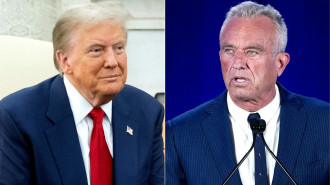Myanmar military likely behind 'crimes against humanity': UN expert
Thomas Andrews told the UN Human Rights Council in Geneva that Myanmar was currently being "controlled by a murderous, illegal regime".
"There is growing evidence that (the) Myanmar military, led by the same senior leadership, is now likely engaging in crimes against humanity, including acts of murder, enforced disappearance, persecution, torture."
While stressing that such offences can only be determined in a court of law, he said there was clear evidence that the junta's crimes were "widespread", "systematic" and part of a "coordinated campaign".
He also said they were being carried out with "the knowledge of senior leadership", including junta leader Min Aung Hlaing.
The United Nations Special Rapporteur was presenting his latest report on the situation to the council, but lamented that since its publishing last week, the numbers of people killed and detained by the military had swelled significantly.
'Utmost restraint'
Diplomatic pressure has been building since the generals seized power, triggering daily protests around the country that they have struggled to quell.
The military has defended its takeover by citing voting irregularities in the November elections won by now-ousted civilian leader Aung San Suu Kyi's party.
Chan Aye, the permanent secretary of Myanmar's foreign ministry, told the UN rights council by video message Thursday that the authorities "have been exercising utmost restraint to deal with violent protests."
Twitter Post
|
But according to Andrews, "Myanmar security forces have murdered at least 70 people" since February 1, most of them under the age of 25.
His comments came as nine protesters were shot dead in Myanmar on Thursday.
And as of Wednesday evening, the junta had arbitrarily arrested and detained more than 2,000 people, he said, while "the violence against protesters, including violence against people sitting peacefully in their homes, is steadily increasing".
International action needed
Even before the coup, the current leadership in Myanmar was facing charges for "atrocity crimes" and "genocide" before the International Criminal Court over its treatment of Rohingya Muslims, Andrews recalled.
"Since the coup, the Myanmar military has attacked and forcibly displaced several thousand members of ethnic nationalities from their homes," he said.
Andrews said that in light of evidence that "the Myanmar junta is engaged in atrocity crimes against its own people right now", urgent action was needed.
Last week, the expert had urged the UN Security Council to impose an arms embargo and targeted sanctions again Myanmar's military.
The Security Council, which includes Myanmar's main traditional backer China, has not heeded that call, although it did issue a statement Wednesday expressing deep concern about the situation.
Andrews described the statement as "wholly insufficient", insisting the people of Myanmar need not only words of support but supportive action."
"They need the help of the international community, now," he said.
Sanctions, arms embargo?
He suggested that countries should find a way to side-step the perpetually-blocked Security Council and impose coordinated sanctions.
"The reluctance of a few nations to act should not prohibit the coordinated action of those that are," he said.
He called for the creation of an emergency "Coalition for the People of Myanmar", to coordinate sanctions and an arms embargo, and also seek to try Myanmar's senior security officials under universal jurisdiction.
Read also: The facade of Myanmar's democracy: How global powers failed Rohingya Muslims
A draft resolution on the situation in Myanmar was meanwhile tabled Thursday for consideration at the rights council later this month.
Like a resolution adopted during a special session of the council last month, the text calls on the military to restore civilian rule and immediately release Suu Kyi and others who have been arbitrarily detained.
It also demands "full, unrestricted and unmonitored access" for all UN mandate-holders, including Andrews and a special team already gathering prosecutory evidence on crimes previously committed in the country, especially against the Rohingya.
And the text asks UN chief Antonio Guterres to provide such investigators with the increased assistance and resources needed to fully probe the situation.
Agencies contributed to this report.
Follow us on Facebook, Twitter and Instagram to stay connected







 Follow the Middle East's top stories in English at The New Arab on Google News
Follow the Middle East's top stories in English at The New Arab on Google News
![The new film casts Israeli actors to tell the story of Mary while leaving out Palestinians [Getty]](/sites/default/files/styles/image_330x185/public/2024-11/GettyImages-2172155541.jpg?h=199d8c1f&itok=wJWyXDEQ)
![Ben & Jerry's has taken Unilever to court for its alleged attempts to silence it [Getty]](/sites/default/files/styles/image_330x185/public/2024-11/GettyImages-2183900214.jpg?h=199d8c1f&itok=jEcYtQ64)
